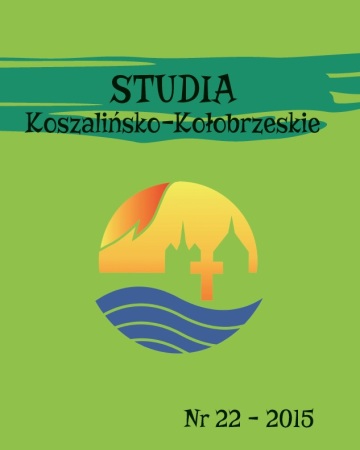
ISSN: 1230-0780
eISSN: 2719-4337
OAI
DOI: 10.18276/skk.2015.22-15





Issue archive /
nr 22 2015
Nie taki prosty. Meandry linearnej koncepcji czasu w chrześcijaństwie
(Not so straightforward. Meanderings of the linear concept of time in Christianity)
| Authors: |
Zbigniew
Danielewicz
Wydział Humanistyczny Politechnika Koszalińska |
| Keywords: | Concepts of time: linear and non-linear time and the modern scientific revolution; time and history Oscar Cullmann |
| Data publikacji całości: | 2015 |
| Page range: | 14 (229-242) |
Abstract
The paper discusses the notion of time – one of fundamental importance in Christianity (John Paul II) – interpreting it as linear. The problem lies in the question whether the linear conceptof time exhausts its full doctrinal interpretation. The author looks for the conceptual origins of linear time and pinpoints the crucial sources: the modern scientific revolution (the discoveryof the depths of time stretching from 6 thousand years to 13.7 billion years), post-Enlightenment weakening of the idea of Providence, cultural transformations and exchanges leading tolearning about other perspectives on time. The author is inclined to support the thesis that the linear concept of time as a Bible-based one, and as formulated in the 20th C. by Oscar Cullmannand related to the historic-salvific orientation of modern theology, can only be accepted under some conditions, i.e. once one acknowledges the influence of the aforementioned modern sources on its formulation. These sources broaden the interpretation of the origin of this problematic concept.
Download file
Article file
Bibliography
| 1. | Aersten J. A., Aquinas Philosophy in its Historical Context, w: The Cambridge Companion to Aquinas, red. N. Kretzmann, E. Stump, Cambridge University Press 1993, s. 12-37. |
| 2. | Augustyn, Państwo Boże, przeł. W. Kubicki, Kęty 2002. |
| 3. | Augustyn, Wyznania, przeł. Z. Kubiak, Warszawa 1987. |
| 4. | Bartnik C., Historia zbawienia, w: Encyklopedia katolicka, t. 6, Lublin 1993. |
| 5. | Copleston F., Historia filozofii. t. I. Grecja i Rzym, przeł. H. Bednarek, Warszawa 1998. |
| 6. | Copleston F., Historia filozofii. t. II. Od Augustyna do Szkota, przeł. S. Zalewski, Warszawa 2000. |
| 7. | Cullmann O., Christ and Time. The Primitive Christian Conception of Time and History, trans. F.V. Filson, London 1962 (revised edition). |
| 8. | Danielewicz Z., Aporie teologii czasu, w: Instaurare omnia in Christo. O zbawieniu, teologii, dialogu i nadziei. Profesorowi Wacławowi Hryniewiczowi w 70. rocznicę urodzin, red. P. Kantyka, Lublin 2006. |
| 9. | Danielewicz Z., Idea postępu w kulturze Europy. Od narodzin do dzisiejszego kryzysu, Koszalin 2015. |
| 10. | Gadacz T., Czas, wieczność, sens dziejów, w: Religia wobec historii, historia wobec religii, red. E. Przybył, Kraków 2007. |
| 11. | Gilson E., Historia filozofii chrześcijańskiej w wiekach średnich, przeł. S. Zalewski, Warszawa 1987. |
| 12. | Gorst M., Measuring Eternity. The Search for the Beginning of Time, New York 2001. |
| 13. | Góźdź K., Teologia historii zbawienia według Oscara Cullmanna, Lublin 1996. |
| 14. | Heller M., Uchwycić przemijanie, Kraków 2010. |
| 15. | Jan Paweł II, Encyklika Fides et ratio, „L’Osservatore Romano” (1998), nr 11, s. 4-40. |
| 16. | Jan Paweł II, List Apostolski Tertio millennio adveniente, „L’Osservatore Romano” (1994), nr 12, s. 4-22. |
| 17. | Jankowski A., Biblijna teologia czasu, Kraków 2001. |
| 18. | Jusiak J., Czy możemy mieć pojęcie czasu?, „Ethos” (2012), nr 99. |
| 19. | Kantorowicz E.H., Dwa ciała króla. Studium ze średniowiecznej teologii politycznej, przeł. M. Michalski, A. Krawiec, Warszawa 2007. |
| 20. | Koyré A., From the Closed World to the Infinite Universe, Baltimore 1957. |
| 21. | Krasnodębski Z., Upadek idei postępu, Kraków 1995. |
| 22. | Landes D.S., Bogactwo i nędza narodów. Dlaczego jedni są tak bogaci, a inni tak ubodzy, przeł. H. Jankowska, Warszawa 2005. |
| 23. | Landes D.S., Zegary i bogactwo narodów, w. Socjologia codzienności, red. P. Sztompka, M. Bogunia-Borowska, Kraków 2008, s. 515-523. |
| 24. | Le J. Goff, Od czasu średniowiecznego do czasu nowożytnego, przeł. A. Frybes, w: Czas w kulturze, wybór, oprac. i wstęp A. Zajączkowski, Warszawa 1988, s. 357-374. |
| 25. | Löwith K., Historia powszechna i dzieje zbawienia. Teologiczne przesłanki filozofii dziejów, przeł. J. Marzęcki, Kęty 2002. |
| 26. | Markosian N., Time, w: Stanford Encyclopedia of Philosophy, http://plato.stanford.edu/entries/time/. |
| 27. | Maternicki J., Historia. III. Dziedzina wiedzy, w: Encyklopedia katolicka, t. 6, Lublin 1993, k. 942-943. |
| 28. | Mickiewicz F., Zbawczy wymiar czasu w literaturze biblijnej, „Communio. Międzynarodowy Przegląd Teologiczny” (2001), nr 6, s. 51-69. |
| 29. | Moltmann J., The Coming of God. Christian Eschatology, przeł. z niem. M. Kohl, Fortress Press, Minneapolis 1996. |
| 30. | Montesquieu C.L., Listy perskie, przeł. T. Żeleński (Boy), Warszawa 1979, s. 204. |
| 31. | Newton I., Mathematical Principles of Natural Philosophy, tr. Andrew Motte London: Benjamin Motte, 1729. |
| 32. | Nicola U., Filozofia, przeł. M. Salwa, Warszawa 2006. |
| 33. | Nisbet R. History of the Idea of Progress, New Brunswick-London 2009 (4 wyd.). |
| 34. | Rad G. von, Teologia Starego Testamentu, przeł. B. Widła, Warszawa 1986. |
| 35. | Reinhard W., Życie po europejsku. Od czasów najdawniejszych do współczesności, przeł. J. Antkowiak, Warszawa 2009. |
| 36. | Sobór Watykański II. Konstytucje – Deklaracje – Dekrety, Poznań-Warszawa 1986. |
| 37. | Teske R.J., Paradoxes of Time In Saint Augustine, Milwaukee 1996. |
| 38. | Weinert F., The March of Time. Evolving Conceptions of Time In the Light of Scientific Discoveries, Berlin-Heidelberg 2013. |